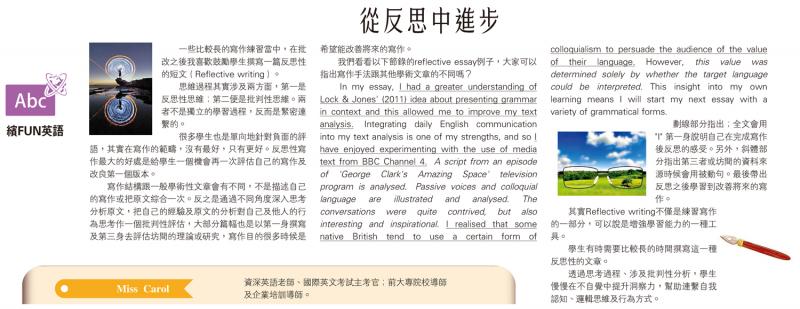
圖:從反思中進(jìn)步
一些比較長(zhǎng)的寫作練習(xí)當(dāng)中,在批改之后我喜歡鼓勵(lì)學(xué)生撰寫一篇反思性的短文(Reflective writing)�����。
思維過(guò)程其實(shí)涉及兩方面����,第一是反思性思維���;第二便是批判性思維�。兩者不是獨(dú)立的學(xué)習(xí)過(guò)程����,反而是緊密連系的。
很多學(xué)生也是單向地針對(duì)負(fù)面的評(píng)語(yǔ)�,其實(shí)在寫作的范疇,沒(méi)有最好���,只有更好��。反思性寫作最大的好處是給學(xué)生一個(gè)機(jī)會(huì)再一次評(píng)估自己的寫作及改良第一個(gè)版本���。
寫作結(jié)構(gòu)跟一般學(xué)術(shù)性文章會(huì)有不同���,不是描述自己的寫作或把原文綜合一次。反之是通過(guò)不同角度深入思考分析原文��,把自己的經(jīng)驗(yàn)及原文的分析對(duì)自己及他人的行為思考作一個(gè)批判性評(píng)估�����,大部分篇幅也是以第一身撰寫及第三身去評(píng)估坊間的理論或研究�����,寫作目的很多時(shí)候是希望能改善將來(lái)的寫作��。
我們看看以下節(jié)錄的reflective essay例子�,大家可以指出寫作手法跟其他學(xué)術(shù)文章的不同嗎�����?
In my essay, I had a greater understanding of Lock & Jones' (2011) idea about presenting grammar in context and this allowed me to improve my text analysis. Integrating daily English communication into my text analysis is one of my strengths, and so I have enjoyed experimenting with the use of media text from BBC Channel 4. A script from an episode of 'George Clark's Amazing Space' television program is analysed. Passive voices and colloquial language are illustrated and analysed. The conversations were quite contrived, but also interesting and inspirational. I realised that some native British tend to use a certain form of colloquialism to persuade the audience of the value of their language. However, this value was determined solely by whether the target language could be interpreted. This insight into my own learning means I will start my next essay with a variety of grammatical forms.
劃線部分指出��;全文會(huì)用"I" 第一身說(shuō)明自己在完成寫作后反思的感受��。另外,斜體部分指出第三者或坊間的資料來(lái)源時(shí)候會(huì)用被動(dòng)句���。最后帶出反思之后學(xué)習(xí)到改善將來(lái)的寫作�����。
其實(shí)Reflective writing不僅是練習(xí)寫作的一部分�����,可以說(shuō)是增強(qiáng)學(xué)習(xí)能力的一種工具�。
學(xué)生有時(shí)需要比較長(zhǎng)的時(shí)間撰寫這一種反思性的文章���。
透過(guò)思考過(guò)程����、涉及批判性分析�,學(xué)生慢慢在不自覺(jué)中提升洞察力,幫助連系自我認(rèn)知����、邏輯思維及行為方式。
Miss Carol
資深英語(yǔ)老師���、國(guó)際英文考試主考官�;前大專院校導(dǎo)師及企業(yè)培訓(xùn)導(dǎo)師。



 京公網(wǎng)安備11010502037337號(hào)
京公網(wǎng)安備11010502037337號(hào)